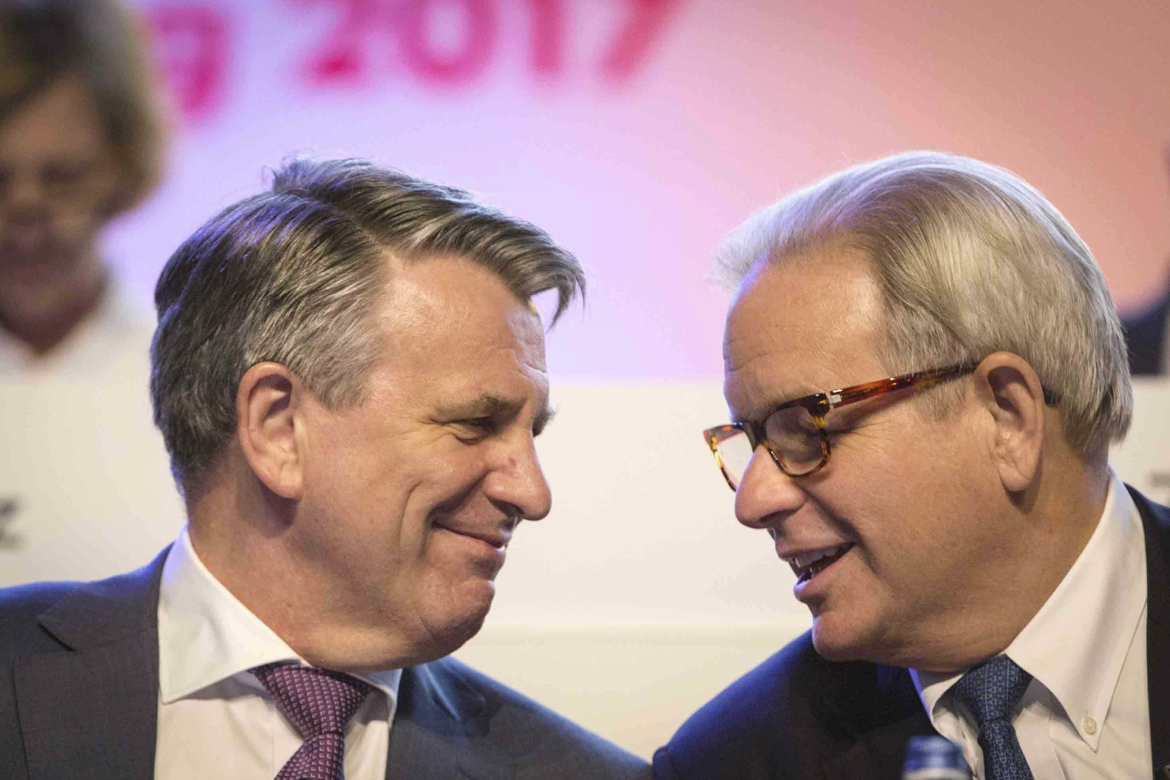Below is a summary of a longer article (24 April 2020) that was published in Dutch by Follow the Money on how multinationals, including Shell, are using money meant for corona measures to fill the pockets of their shareholders. (Picture: Ben van Beurden and Charles Holliday)
The European Central Bank (ECB) is not allowed to finance the Corona crisis measures that are taken by governments by printing more money. However, printing money for business is allowed. Royal Dutch Shell, among others, makes good use of it. And so, the new corona euros of the ECB eventually end up in the pockets of the shareholders of multinationals.
The European economy is facing the worst shock in modern history. Governments release huge budgets for economic support measures. The economic recession will cut tax revenues by 10 to 20 percent of GDP, while spending will increase by 10 to 20 percent. That is why more and more economists are advocating “monetary financing”. Simply put: cranking up the (digital) money press to finance crisis policy. However, this requires political intervention in Europe. Monetary financing of governments – raising government budgets with new ECB money – is prohibited in the euro zone.
Money for multinationals
But what the ECB is allowed to do is monetary finance for companies: using the money press to buy corporate bonds (loans). The ECB has been doing this since 2016 via the so-called Corporate Sector Purchase Program (CSPP), to which the Pandemic Emergency Purchase Program (PEPP) has recently been added, especially for the corona crisis. Every month, literally at the touch of a button on a keyboard, the ECB creates 7 billion new euros, of which a fifth is lent directly (and four fifths via an intermediary) to companies. The ECB has already created more than 206 billion new euros. Of this, EUR 37 billion went directly into the accounts of large companies; and more than $ 165 billion through an intermediary detour.
Follow the Money sifted through the CSPP / PEPP’s purchase list and found that many large corporations borrowed cheap ECB money directly in April. Royal Dutch Shell borrowed 3 billion euros on April 7, at an average interest rate of 1.5 percent. It is not known exactly how much money the central bank created to finance Shell. What is clear: while these companies borrow money from the ECB on the one hand, they pay billions to their shareholders on the other.
In addition, large multinationals have used their cheap credit to buy back their own shares. For example, in 2018 Shell launched a share buyback program worth $ 25 billion. Such buyback programs are popular as they drive up their own share price (which is often linked to top management bonuses) and reduce the number of shareholders to whom the dividend is distributed.
EU citizens bear the risks
Financing dividend payments and share buybacks with debt is not without social risks: it increases the fragility of companies. The larger the business segment that is debt-financed, the smaller the “buffer” of shareholders to absorb the blows when things are going wrong. Despite this knowledge, multinationals, both in the US, Europe and Japan, have made full use of the low interest rates to incur debt precisely for those purposes. Shareholders benefited from the good times, while lenders – in the case of the ECB, all Europeans combined – bear the risks now that the economy is faltering due to the corona crisis.
The ECB is also now aware that cheap corporate credit has largely been used in recent years to attract shareholders. In March, just days after the announcement of the Pandemic Emergency Purchase Program, the central bank called on banks not to pay a dividend for 2019 and 2020 due to the pandemic. European governments are asking companies that receive financial support to do the same.
But the ECB has no weapon to enforce this reluctance. The bank also does not stop financing companies that channel cheap credit to its own shareholders. An initial inventory of the PEPP purchase list shows that the fresh corona money ends up in abundance with companies that immediately ignored the calls.
Oil and CO2 commitments
Oil companies have been under enormous pressure since the beginning of this year. With the massive drop in oil and gas prices filling them, you would expect at least a smaller profit payout. But that is not the case. For example, Shell immediately announced that it has always paid dividends since World War II, and that it intends to continue to do so in this corona crisis. Shell maintains its reputation as one of the largest dividend payers in the world.
To pay dividends without making a profit, Shell must have enough money. Loans are another solution: Shell expanded its credit facility with banks with $ 12 billion and issued new bonds, raising $ 3.75 billion and € 3 billion respectively. Three days later, the Eurobonds were already partly on the ECB’s balance sheet. The 3 billion euros and 3.75 billion dollars that Shell thus obtained will be just not enough to pay the dividends for the next 2 quarters. Other oil companies use the same strategy.
This shows that the promise of ECB President Christine Lagarde to “phase out carbon-intensive investments” is unfulfilled. A commitment she made in February, after the European Parliament agreed to include climate change targets in ECB policy.

